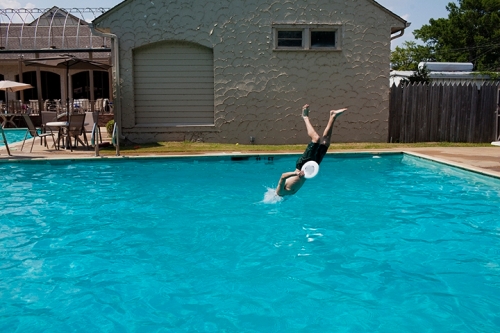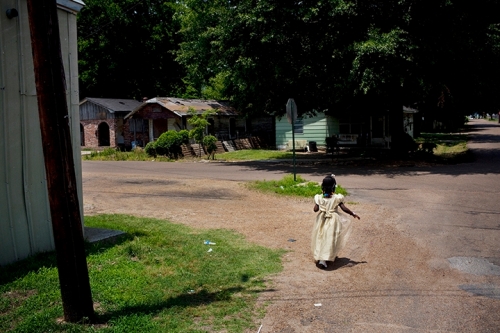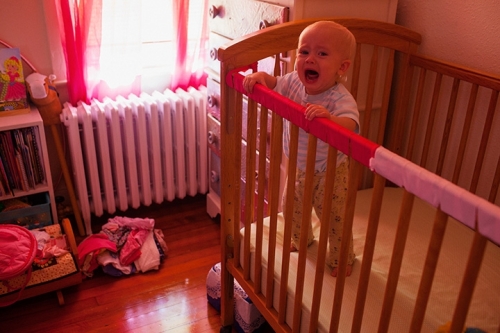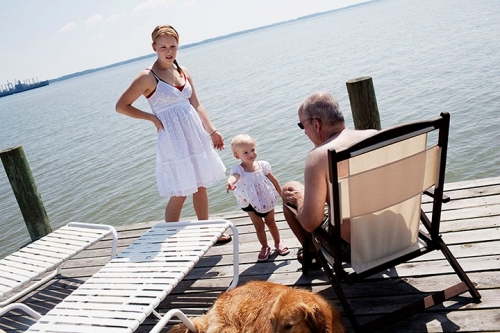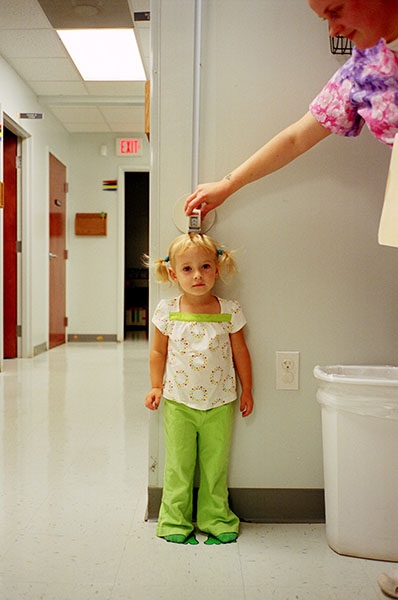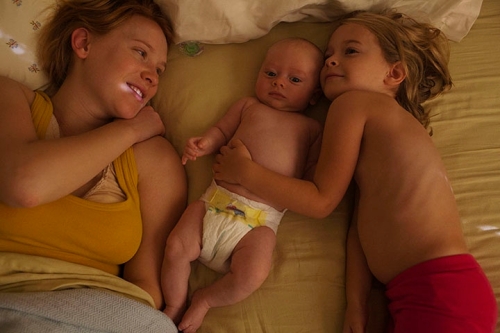The Eye of Matt Eich
by abigailsmithson
From shooting on the road to inside his own home, Matt Eich´s camera gives us a view on several worlds. I had the chance to speak with him about his documentary project Sin and Salvation in Baptist Town, which shows a large economic disparity between two, almost completely segregated neighborhoods in the Mississippi town of Greenwood. In addition, we talked about his work Love in the First Person, a project about his own family, his wife Melissa and his two daughters Madelyn (age 6) and Meira (age 1). His consistent interest in a range of groups and his ability to shoot in familiar and unfamiliar situations creates a sense of understanding and respect, for people both in his immediate family and people on the outside.
Abigail Smithson: What element of your documentary work comes most naturally to you? Are there usually some nerves involved in the beginning?
Matt Eich: There are always nerves involved, though I try not to let them control me, or what I produce. Will this person like me? Will they accept me? Will they get what I’m trying to do? Will they say yes? Will they say no? Should I stop and talk to that person? Those kinds of questions always permeate the day-to-day. I feel like I am pretty good at making people comfortable with my presence, and I’m OK at articulating my purpose, though there are certainly times when my own nervousness about fucking up can make the subject nervous as well and affect the outcome.
© Matt Eich¨”Fat Man” takes early steps towards his mother’s friend as they spend time together on a front porch on July 3, 2010 in the Baptist Town neighborhood of Greenwood, Mississippi¨
©Matt Eich¨Diving into the pool at the Greenwood Country Club on May 19, 2012 in Greenwood, Mississippi¨
AS: Specifically for the work Sin and Salvation in Baptist Town how did you originally find the disparity between the two neighborhoods and what was your reaction?
ME: I found it by simply driving through Greenwood for an assignment that took me to the Baptist Town neighborhood. “What a cute place” I thought when driving in. Then we crossed the tracks into a whole different world, and suddenly the disparity was glaring. It couldn’t be ignored. If you meant how did it feel then I would say it felt strangely foreign and familiar. It was not a place I had ever been to before, but it already existed in my mind. I was aware of the generalities of race and segregation in the south, but had never come in such close proximity to a place that embodied a lot of assumptions we make as outsiders. But the people there were what made me come back. The stereotype of “southern hospitality” transcended race, color and socioeconomic standing. The people are very nice in Greenwood, but they are also incredibly complex.
©Matt Eich ¨A cooking class at The Alluvian Cooking School in Greenwood, Mississippi on December 3, 2011¨
©Matt Eich ¨Dialia Wooten walks home from church in Baptist Town, Mississippi on Sunday, May 23, 2010. The youngest of three children, her father is currently in prison for running guns. Dialia’s mother Vicki stresses the importance of an education to rise above their surroundings and the children all proudly bring home above average grades¨
AS: Did both communities/neighborhoods know the purpose of your project originally? How did you approach the subject of the division with them? Was your purpose understood and respected?
ME: When I started, I focused entirely on the Baptist Town neighborhood. I wanted to understand what elements coalesce to create a pocket of poverty, crime and violence. I wanted to get to know the people and see a little bit of what their daily lives are like. It was more than a year of working there quietly before I began reaching out and meeting other members of the community. I didn’t want to be making wild assumptions, but rather base the questions that would be the foundation of the work on experiences and encounters that I had.
AS: What is the difference in feel between both groups? Is there a group you felt more comfortable working with consistently?
ME: There are numerous differences and parallels between the two groups. The patterns in which people live and work are totally different. In the Baptist Town neighborhood, I can park my car and wander the streets almost any time of the day or night and someone will be out and about that I can talk to, interact with or photograph. People there typically want to be seen and are happy to be photographed. When I drive across the river to north Greenwood, people are typically in these preordained spaces, and not just out and about. They can be found at work, or at home; in both places there are layers of things that separate me from interacting with people and making photographs. When I do get access, there is a greater distrust, because people there are often painted with a broad brush as being racist by default, because they are white. This isn’t true, obviously, but the distrust can be sensed in the images. I feel there are more walls (literally and metaphorically) between me and the more affluent community. I am comfortable with most of the people I’ve met in Greenwood – they are incredibly warm, curious and open.
©Matt Eich ¨(L-R) Jabari Wilson sits next to his cousin Korwin “Quan” and mother Ellen in the dining room of the home he shares with his mother, sister Nikki and her girlfriend Dominique in the Baptist Town neighborhood of Greenwood, Mississippi on Saturday, November 6, 2010. Jabari and his sister Nikki both work to support their mother who has a number of health problems and is unable to work. Quan (center) lost his mother in a car accident as a child and has been raised by his grandmother ever since¨
AS: Did you ever purposely try and contrast your photos? Did you ever get an image that you liked and look for a similar moment in the other neighborhood?
ME: There are certainly images that I try to have in the back of my mind when photographing on the different sides of town, but if I overthink it, the situation is usually a bust. It is the organic parallels that cannot be forced into existence that most interest me.
©Matt Eich¨A group of young people builds a tower of beer cans at a party in north Greenwood, Mississippi on August 8, 2012¨
© Matt Eich ¨Vickie Wooten cooks dinner for her three children in Baptist Town, Mississippi on Wednesday, April 21, 2010. Her husband, a four-time convicted felon, is currently serving time in prison for running guns. Vickie and her children were evicted a few months later for not being able to pay their rent¨
AS: Does this drastic change in economics and race between the two neighborhoods seem purposeful in anyway to you? What were some of the discussions you had with the citizens about this?
ME: To the best of my understanding, this is the result of a sort of de-facto segregation that is unspoken and has existed this way for decades. It’s where people (from both sides) are most comfortable. It’s what is familiar. It’s what they know. At the same time, while the folks living in Baptist Town are connected to a deep-rooted sense of community and family, they typically face more day-to-day struggles and have fewer opportunities for advancement. Even their ideas of success and advancement differ from the folks in north Greenwood.
AS: What sort of connection do you form with these places that you document? There might not be a common theme for all of them but there must be a level of comfort that you reach in each area.
ME: Each place definitely has its own vibe that I try to tune in to, and a rhythm I will get into when I visit. There are places where I feel safe, or comfortable, and I use those as a launching point. Maybe it’s a porch that I know I can always go sit on, or a bar I know I can always go get a drink at, or a park where there are always people out. From there, I just have to be open to new experiences and seeing where the day will lead.
AS: This question has less to do with the specific project and more to do with your own take on photography. You seem to photograph everything, not skipping a beat. From your home life to your own personal work and assignments. Do you ever feel that your camera comes between you and an experience? That it is a weight around your neck or causes people to interact with you in a certain way?
ME: Sure, it can become a barrier to fully experiencing a moment if I’m not careful. But I prefer to think of it as a tool, an instrument, with which I can remember, mark moments as beautiful and express a small portion of the myriad of emotions that comes with being a father and a husband. There are times where the presence of the camera is a hindrance, because people are afraid of it. In those situations, I try to communicate with people to identify and address their concern.
© Matt Eich ¨Melissa Eich takes a bath in Portland, Oregon on July 10, 2007. She is six months pregnant, and almost ready to deliver by the time we return to Ohio to resume our college classes¨
© Matt Eich 2013
AS: Along the same lines, how often do you want to take a photo and stop yourself?
ME: All the time. I’m aware of how many eyebrows a camera can raise, so I censor myself a lot, in order to avoid the inevitable confrontation.
AS: In this amazing way your photos create equality between groups. I am sure as a father, you love and care for your children and family more than other families. But through your photographs there is a sense of respect and equal interest for all groups. Can you tell me about the differences between shooting your family and shooting outside of your home?
ME: We often forget who our neighbors are. It’s everyone around us. Meeting people where they are at, and approaching them with respect is a necessary part of my process. My personal feelings have some small role, but for the most part when photographing in other communities, I try to think of myself as a conduit.
©Matt Eich 2012
©Matt Eich ¨Melissa and Madelyn on the pier with her grandfather David Eich on the Fourth of July in Smithfield, Virginia on Saturday, July 4, 2009¨
©Matt Eich 2012
©Matt Eich ¨Madelyn reacts unfavorably to a food she was told she needed to eat before she could have dessert in Norfolk, Virginia on November 13, 2010¨
AS: Do you feel like people act differently around you when they know you have a camera? How much truth do you think you can get and can you read people/tell when they are going to offer a less compelling portrait?
ME: Some people are more showy, and some are more guarded, but the presence of the camera almost always alters the “truth” of a situation. Occasionally I can tell right off the bat if the situation is going to yield something, but just as often, it is a surprise I find after the fact.
AS: Far from the slide shows of family vacations and looping screensavers of birthday parties, your family images tell a compelling story of a life in 2013. How specifically are you shooting? Do you want these images to be your children´s childhood snapshots or do you want to tell a story to the world?
ME: There isn’t a specific way I am documenting my family but I am trying to create images that function on several levels: first, for my family as an album of sorts where I can express my love and devotion to them. Secondly, the work should also function for a larger audience because there are universal moments contained within our daily life. Elements that I routinely depict range from family walks to birthdays and bath time. When put together, you can begin to see the passage of time. The final thing I am thinking about (in the back of my mind) is how the images will be read in 50+ years. There are little markers that hint at where and when the images were made. My guess is that in a few decades we will look at an image of a child watching TV on an iPad and react similarly to how we now view photographs of children watching black and white TV sets in the 1950s.
© Matt Eich ¨Madelyn gets measured at a doctor’s visit in Suffolk, Virginia on July 11, 2010¨
© Matt Eich ¨Meira Ruby Eich is born on September 11, 2012 at Obici Hospital in Suffolk, Virginia¨
© Matt Eich ¨Melissa Eich next to her daughters Meira and Madelyn in bed in the morning in Norfolk, Virginia on November 12, 2012¨
AS: Did you know that your own life and your family´s life would become something that you would want to document so fervently?
ME: Yes. When my wife and I started dating I joked with her at one point, “You know if you get pregnant, I’m going to photograph the whole thing.”
© Matt Eich ¨Madelyn, 4, hides behind the curtain while Melissa stands by in the kitchen during an attempted portrait session to document the pregnancy on March 18, 2012¨
AS: Do you feel a responsibility to photograph?
ME: Responsibility is a strong word … not that I am averse to it, but I feel like what drives me to make photographs is less responsibility and more compulsion. I do, however, feel responsible for the images that I make and how they are disseminated. The function of the image has become of increasing concern to me in recent years, and that is where responsibility comes into play.
© Matt Eich ¨Winky Williams checks Brandon’s ’40 to see if there’s one in the chamber before stepping behind the abandoned building and popping three off in the air in the middle of the day in the Baptist Town neighborhood of Greenwood, Mississippi on Wednesday, May 19, 2010. After entering prison at the age of 14 for seven and a half years, reintegration into society has been difficult for Winky, now 27, who struggles to find a legitimate income to provide for his family¨
©Matt Eich¨Melissa comforts Madelyn after her first childhood immunizations on December 6, 2007 in Athens, Ohio¨
To see more of Matt´s work, click here.
His portraits are currently featured on Flak Photo´s online exhibition ¨Making Pictures of People¨ http://flakphoto.com/exhibition/making-pictures-of-people#matt-eich
He was also recently the recipient of a grant from Getty for editorial photography. The grant will go towards continuing Sin and Salvation in Baptist Town. To read more about the grant and project, click here
The grant announcement was also featured on the NY Times Lens Blog.
Images and video from his work The Seven Cities are currently on display at the Virginia Museum of Contemporary Art in Virginia Beach, VA. Read more details here.
Follow his instagram feed here. And his two blogs The Seven Cities and Sin and Salvation in Baptist Town.


